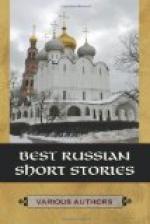Chekhov’s works show an astounding resourcefulness and versatility. There is no monotony, no repetition. Neither in incident nor in character are any two stories alike. The range of Chekhov’s knowledge of men and things seems to be unlimited, and he is extravagant in the use of it. Some great idea which many a writer would consider sufficient to expand into a whole novel he disposes of in a story of a few pages. Take, for example, Vanka, apparently but a mere episode in the childhood of a nine-year-old boy; while it is really the tragedy of a whole life in its tempting glimpses into a past environment and ominous forebodings of the future—all contracted into the space of four or five pages. Chekhov is lavish with his inventiveness. Apparently, it cost him no effort to invent.
I have used the word inventiveness for lack of a better name. It expresses but lamely the peculiar faculty that distinguishes Chekhov. Chekhov does not really invent. He reveals. He reveals things that no author before him has revealed. It is as though he possessed a special organ which enabled him to see, hear and feel things of which we other mortals did not even dream the existence. Yet when he lays them bare we know that they are not fictitious, not invented, but as real as the ordinary familiar facts of life. This faculty of his playing on all conceivable objects, all conceivable emotions, no matter how microscopic, endows them with life and a soul. By virtue of this power The Steppe, an uneventful record of peasants travelling day after day through flat, monotonous fields, becomes instinct with dramatic interest, and its 125 pages seem all too short. And by virtue of the same attribute we follow with breathless suspense the minute description of the declining days of a great scientist, who feels his physical and mental faculties gradually ebbing away. A Tiresome Story, Chekhov calls it; and so it would be without the vitality conjured into it by the magic touch of this strange genius.
Divination is perhaps a better term than invention. Chekhov divines the most secret impulses of the soul, scents out what is buried in the subconscious, and brings it up to the surface. Most writers are specialists. They know certain strata of society, and when they venture beyond, their step becomes uncertain. Chekhov’s material is only delimited by humanity. He is equally at home everywhere. The peasant, the labourer, the merchant, the priest, the professional man, the scholar, the military officer, and the government functionary, Gentile or Jew, man, woman, or child—Chekhov is intimate with all of them. His characters are sharply defined individuals, not types. In almost all his stories, however short, the men and women and children who play a part in them come out as clear, distinct personalities. Ariadne is as vivid a character as Lilly, the heroine of Sudermann’s Song of Songs; yet Ariadne is but a single




